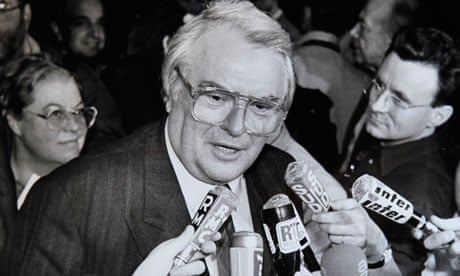Pierre Mauroy, who has died aged 84, was France's first socialist prime minister under the Fifth Republic. When François Mitterrand was elected president in May 1981, he put Mauroy at the head of a government intent on radical social reform. Though his tenure lasted just three years, he remained a significant figure in the French Socialist party (PS) for the rest of his life.
His base was in the north, as mayor of Lille (1973-2001), president of the Nord Pas de Calais region (1974-81) and member of the National Assembly for the Nord département (1973-81 and 1986-92). It was an area where the SFIO party, the French section of the Workers' International, was strong, and Mauroy was the standard-bearer for the SFIO in the alliance that came together as the PS in 1969-71.
Its two leading figures, Mitterrand and Mauroy, needed to find a way of working with the Communist party (PCF). This led to their first public disagreement, in 1979. Mitterrand wanted an alliance; Mauroy, always suspicious of communist ideology while counting many communists among his friends, opposed Mitterrand by backing Michel Rocard and appealing for the socialists to stand firm at the PS congress at Metz. However, he still became Mitterrand's spokesman during the 1981 presidential campaign.
Once the PCF candidate, Georges Marchais, was eliminated in the first round, Mitterrand enjoyed sufficient leftwing support to beat the incumbent, Valéry Giscard d'Estaing. And once he had appointed Mauroy as prime minister, he was able to hold National Assembly elections that gave the PS an overall majoriy.
Mauroy's trade-union background and old-fashioned socialism did much to sustain Mitterrand's credibility in campaigning on a platform of 110 Propositions for France. The new government trimmed the working week from 40 hours to 39, lowered the retirement age to 60, introduced a fifth week of paid holiday, improved workers' rights, raised welfare benefits and abolished the death penalty.
By 1982-83 revised budgets and austerity measures proved necessary, and in July 1984 Mitterrand sacked Mauroy during the crisis over private – that is to say, Catholic – schools. In his election manifesto, Mitterrand had promised a unified, secular education system. When rightwing activists and the clergy took to the Paris streets, he backtracked, and Mauroy was replaced by Laurent Fabius.
In 1988, Mauroy beat Fabius in a vote to become the PS's first secretary. During the 1990 Rennes party congress, Mitterrand supported a move to replace Mauroy with Fabius, but again the former prevailed, gaining another term.
Mitterrand sought to adapt French Socialism to new, technocratic values: he saw Mauroy as representing the working-class northern mining communities at a time when the mines were being dismantled. Many younger socialists viewed him as a political dinosaur, and in public he was indeed a rhetorical speechmaker of the old school. Nonetheless, during his time as first secretary the PS did well in the 1989 municipal elections, and the bluff public speaker produced several books on political theory and his involvement in politics.
Born into a family of seven children in Cartignies, near the Belgian border, Mauroy was a teacher, like his father; his grandfather had been a woodcutter. By 1950 he was the national secretary of the Young Socialists. Five years later he became secretary general of the Union of Technical College Teachers.
Mauroy was close to Guy Mollet, leader of the SFIO, and in 1966 became his deputy. In turn, he became Mitterrand's deputy as the PS took shape, and they sought a way of making the French left force capable of winning elections.
After his time as the PS's first secretary, Mauroy was president of the Socialist International (1992-99) and member of the French senate for the Nord (1992-2011). He also remained closely involved with the former textile city of Lille.
It suffered from the recession of the 1970s, but was helped by the link with Britain via the Channel Tunnel, opened in 1994. Mauroy ensured the renovation of much of its old town, respecting the original Flemish architecture while modernising interiors. Thanks to him the crumbling was soon transformed into the chic. Among the Lillois he will always be respected for maintaining his northern roots, never spending more than a few days a week away from the city.
He is survived by his wife, Gilberte, also a teacher, whom he married in 1951, and their son, Fabien.
Pierre Mauroy, politician, born 5 July 1928; died 7 June 2013

Comments (…)
Sign in or create your Guardian account to join the discussion